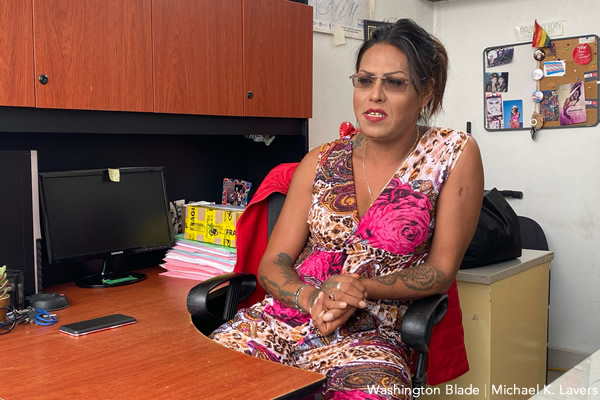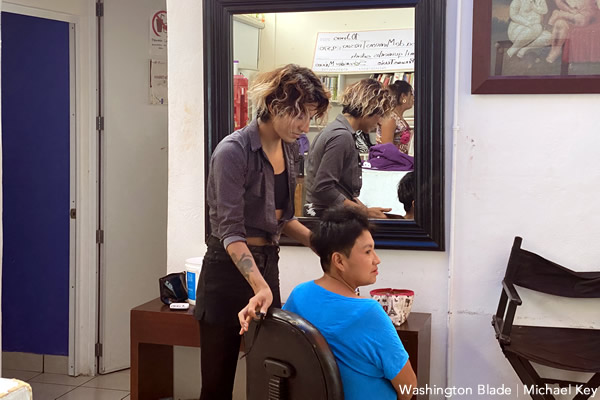World
Mexico City shelter offers second chance for transgender residents
Casa Refugio Paola Buenrostro named after murdered trans sex worker

MEXICO CITY — Alcohol and drugs were the only things that allowed Michel Ríos, 33, to cope with her fears and traumas when she engaged in sex work or tried to face her life as a person with a disability.
Ríos is a transgender woman from Mexico’s Veracruz state who lost one of her legs when she was seven and earned her family’s contempt from the moment she assumed a non-heteronormative sexual orientation and gender identity. Ríos was forced to leave home at 15 and began to earn a living on the streets, alone.
She began to seek help after several years.
Ríos found Casa Refugio Paola Buenrostro, a shelter in Mexico City that Casa de las Muñecas Tiresias, a local advocacy group, runs. She first arrived with the intention of becoming sober through an Alcoholics Anonymous program, but she ended up staying to rebuild her life.
Shelter named in honor of murdered trans sex worker
Kenia Cuevas, a renowned LGBTQ rights activist, founded Casa de las Muñecas after she witnessed the murder of her best friend, Paola Buenrostro, in December 2016 while they were both engaged in sex work. That tragic event was the final straw that motivated her to fight for her community.
Casa Refugio Paola Buenrostro opened its doors in January 2020.
“The mission of our organization is that those people who we welcome know their rights, that they can have a decent life, that they can understand life processes and we can rescue them from situations of vulnerability, of abandonment, when they believe that everything has been lost,” said Cuevas during an exclusive interview with the Washington Blade via Zoom.
International News Editor Michael K. Lavers visited the shelter on Saturday and met with Cuevas.
“In short, what we do is create living conditions in accordance with human rights,” said Cuevas. “We have managed to give visibility to all the problems that trans people face on a day-to-day basis and of which society was not aware.”
Casa de las Muñecas has offices in Mexico City and in Mexico, Nayarit, Morelos and Guerrero states. It has a team of professionals who carry out a variety of services for trans people that includes support for legally changing their identity, legal advice and education workshops.
“We are also entering prisons to provide legal literacy to transgender people, workshops on culture, sports, addictions,” said Cuevas. “When they are released we then rescue them and take them to the home to continue their social reintegration.”
Casa de las Muñecas’ Mexico City shelter is named in honor of Buenrostro. Casa de las Muñecas also plans to open two additional shelters — one in the Mexican capital and another in Mexico state.
Casa de las Muñecas served 1,800 people in its first year of operation, which was 2018. The organization, according to Cuevas, had worked with upwards of 10,000 people last year.
Ríos arrived in July 2020 amid the pandemic. She said the shelter and its residents are now her family, because she has not seen her biological relatives since 2007.
“It is my home, a refuge from discrimination, violence, prostitution, drugs and alcohol,” Ríos told the Blade. “Staying here gives people the opportunity to grow, to achieve their dreams. It tells you that you can still dream. I am 41-years-old and I am dreaming. I am learning to dream here. The house has opened my horizons, it has given me the opportunity to be a different person.”
Ríos’ goal at the shelter is to learn the skills that will allow her to reintegrate into society. Ríos said she also hopes to help other people who may be in the same situation in which she was before she arrived.
“My goal is to finish my ‘prepa’ (high school diploma) and make a career for myself,” said Ríos, who hopes to become a designer.
This educational preparation is part of an intervention strategy that Casa de las Muñecas created in July 2020 to eliminate education disparities among the trans community.
“We do workshops aimed at economic autonomy, connecting them to the labor force,” said Cuevas. “It also allows for psychological support, access to health care, treatment for HIV or hormones, as well as the right to identity, either in their documents or the change of identity.”

Victoria Alejandra Arias, 33, a trans woman who is also from Veracruz state, learned while at the shelter that she is living with HIV. She was diagnosed at the shelter and now receives treatment.
Arias abused alcohol and drugs and was a sex worker.
She said her now ex-partner physically and emotionally abused her. He threatened and blackmailed Arias before they finally ended up in jail.
Arias recalled she was in a desperate physical and mental state when a friend brought her to the shelter on Jan. 7. She has found purpose in her life after less than five months.
“We have several workshops here, we go out to do exercises,” Arias told the Blade. “My life has changed in every way. I have improved in the physical sense because I got too thin. I used crack, a very addictive drug, and it really destroys people. My appearance is improving little by little. I know that I am on my way.”
“Women already have a profession because of all this support,” added Cuevas. “It will be easier for them to integrate themselves into society because they can come out (of here) a little more educated, empowered and know their rights and responsibilities.”
More than 20 people were living in the shelter when Cuevas spoke with the Blade, with 50 names on a waiting list. Canela and Leslie, two rescue dogs, also live at the shelter.
The Mexico City government pays the shelter’s rent and utilities, but donations that mostly come through social networks and people who provide furniture and other items support it. Cuevas donates around 70 percent of her salary.
“Our day at the house starts at 6 in the morning,” said Arias. “We make the bed, we bathe, we put on makeup and we go to our workshops, because part of this place’s goal is to re-educate ourselves.”
Ríos told the Blade the shelter offers English, theater, cosmetology, mathematics, Spanish, science and acting workshops.
“I’ve already imitated Paquita la del Barrio because I look a lot like her physically,” she said. “My favorite workshop is the theater — especially comedy — one because it goes great with my personality. The experience of acting is very beautiful. I have a lot of fun.”
Ríos said she and other workshop participants are preparing to premiere a play in December. She told the Blade they also perform at street festivals and in prisons.
Cuevas said she wants to open a headquarters for Casa de las Muñecas and a shelter in each of Mexico’s 32 states. Cuevas added she would like to expand her work throughout the rest of Latin America.
She said her greatest achievement is the gratitude and happy faces of those who have passed through the shelter.
“Thanks to this place I have regained my dignity,” said Ríos. “I want to live and, despite my disability and all the physical problems, I don’t let myself be defeated and I keep going.”
Arias, meanwhile, hopes to become a stylist “because I want to have a job.”
“I would like to finish my studies,” she said. “I see all those goals closer and stronger now and all that is for my life here. My greatest success is being clean and having goals in my life.”
India
Activists push for better counting of transgender Indians in 2026 Census
2011 count noted 488,000 trans people in country

India is preparing to conduct a nationwide Census in April, the first since 2011.
Interim projections based on the previous Census placed India ahead of China as the world’s most populous country. A Technical Group on Population Projections projection in July 2020, chaired by the Registrar General of India, estimated the country’s population in 2023 was 1.388 billion. Transgender Indians are now raising concerns about the data collectors and their sensitization.
Activists have raised concerns about whether data collectors are adequately sensitive to the community ahead of the Census. Government training material emphasizes household engagement, data privacy and sensitivity while asking personal questions, but publicly available flyers do not outline specific guidance or training related to recording trans identity during enumeration.
Concerns around the counting of trans people in India are not new.
The 2011 Census recorded around 488,000 trans people, a figure activists and researchers have described as a likely undercount due to stigma, misclassification, and a reluctance to self-identify. Subsequent surveys and field reports have pointed to inconsistencies in how gender identity is recorded and the absence of uniform sensitivity among Census data collectors. Rights groups and policy researchers have also warned that gaps in official data affect access to welfare schemes, legal recognition, and targeted public policy, making accurate counting central to future Census exercises.
A decade after the 2011 Census formally recorded trans people as a distinct category, multiple studies have continued to document entrenched socio-economic disparities. Research has pointed to lower literacy rates, limited workforce participation and barriers to healthcare access within the community.
A National Human Rights Commission-supported study cited in subsequent reporting found a significant proportion of trans respondents reported employment discrimination, underscoring the gap between formal recognition and lived economic inclusion.
Educational exclusion has remained a persistent concern within the trans community. Studies have documented higher dropout rates, lower literacy levels and barriers to continuing education, often linked to stigma, discrimination and limited institutional support. Policy researchers note that despite formal recognition in official data after 2011, targeted interventions addressing school retention and access for trans people have remained uneven.
Access to housing schemes has reflected similar gaps.
The Washington Blade in December reported only a small number of trans people have benefited from India’s flagship low-income housing program, despite its nationwide rollout and eligibility provisions. The findings underscored continuing barriers to inclusion in welfare delivery systems.
The Social Justice and Empowerment Ministry and the Office of the Registrar General and Census Commissioner did not respond to the Blade’s multiple requests for comment regarding sensitization measures for Census data collectors and the recording of trans identity in the upcoming Census.
Karnataka state in southern India last September conducted its first statewide baseline survey of gender minorities. The Department of Women and Child Development, in collaboration with the Karnataka State Women’s Development Corporation, launched the initiative to document the lives of trans people across 31 administrative districts.
When the results were released, the survey identified 10,365 trans people. The country’s 2011 Census, by comparison, recorded 20,266 trans people in Karnataka, nearly double the 2025 figure. The discrepancy raised questions about how the state’s recorded trans population appeared to decline over 14 years.
The discrepancy in Karnataka’s survey has intensified scrutiny over how gender minorities are counted. Reports questioned the methodology used in the 2025 exercise, which was conducted over 45 days beginning in mid-September. Instead of door-to-door enumeration, trans people were required to report to designated registration sites — primarily district-level public hospitals and sub-district government health facilities. The approach presented barriers for potential participants, particularly those in rural areas, those without reliable transportation, those wary of institutional settings due to prior discrimination, or those who did not know about the count, raising the possibility of exclusion.
Bihar state in eastern India in January 2023 conducted a caste-based survey that included trans respondents.
The final report identified 825 trans people in the state, compared with 40,827 recorded in the 2011 Census. Activists disputed the figure, calling it inaccurate and pointing to community estimates that suggested higher numbers, including in Patna, the state capital, raising concerns about significant undercounting.
The 2011 Census marked the first attempt to enumerate trans people at the national level, but researchers and activists have described the exercise as limited in scope.
It recorded 487,803 people under the “other” category, a classification used for respondents who did not identify as male or female. Analysts have argued that the figure likely underestimated the community’s size.
The Census questionnaire provided three sex categories — “male,” “female,” and “other” — a framework that critics said did not fully capture the diversity of gender identity and may have affected how some respondents chose to identify.
During the 2011 Census, enumeration practices varied across regions.
In states such as Tamil Nadu, local reporting indicated estimates were at times derived from existing administrative records, including state-issued trans identity cards, rather than solely through door-to-door identification. Such approaches risked excluding individuals who did not possess identity documentation or were not registered with welfare boards, raising concerns about gaps in coverage.
Official data from the Social Justice and Empowerment Ministry shows only a few hundred trans people as of early 2025 have been issued identity cards through the national portal, despite nearly 2,000 applications being submitted. Many are still pending or have been rejected.
Critics of the 2011 Census said many Census data collectors were not adequately trained or sensitized to engage with gender identity beyond traditional binary classifications. Similar, detailed guidelines specific to trans sensitization have not been publicly made available for the 2026 Census, according to an examination of training materials and official circulars.
Akkai Padmashali, a trans rights activist, told the Blade that Census data collectors in earlier exercises were often not sensitized and lacked awareness of intersex people and gender-diverse communities. She said trans people and other gender and sexual minorities continue to face social exclusion and require careful handling during door-to-door data collection. Padmashali called for targeted training of data counting officers and said the government should treat the issue as a priority, adding the trans population is likely to be higher than what was recorded in 2011 and efforts to make officials more sensitive to the community are necessary.
“We will definitely join our hands with this move the government of India has taken,” said Padmashali. “I think there should be proper guidance from the main in-charge people who are conducting this enumeration, and if no such proper information is given to these Census data collectors, it is difficult to gather any sort of information concerned.”
“This whole issue of self-identification — I think India, in its current situation, is not in such a way that it openly accepts people’s identities,” she added. “It will be challenging, it will be difficult, it will be a struggle to offer people the opportunity to express their identities as concerned. But to make sure those who are part of the sexual minority community are counted, I think we also take responsibility for educating people to be part of the enumeration.”
Padmashali said many people are not accustomed to using mobile devices and only a limited number are familiar with them. She said technology should not mislead or misguide the collection of information. Padmashali added she and other trans people plan to engage with Census data collectors and officials who organize the Census.
“Government should have local meetings,” said Padmashali. “Government should hold regional consultations on why the national enumeration is important, because we also know that from 2011 to 2026 is almost 15 years, and now we are here.”
“The government should hold local meetings, especially in their constituencies,” she added. “If the government meets with non-government organizations and civil society groups, this could become a more inclusive exercise across the country. India has a population of more than 1.4 billion, and I think this is the appropriate time to bring accurate statistics to help draft policies in the context of the larger community concerned.”
Books
New book profiles LGBTQ Ukrainians, documents war experiences
Tuesday marks four years since Russia attacked Ukraine

Journalist J. Lester Feder’s new book profiles LGBTQ Ukrainians and their experiences during Russia’s war against their country.
Feder for “The Queer Face of War: Portraits and Stories from Ukraine” interviewed and photographed LGBTQ Ukrainians in Kyiv, the country’s capital, and in other cities. They include Olena Hloba, the co-founder of Tergo, a support group for parents and friends of LGBTQ Ukrainians, who fled her home in the Kyiv suburb of Bucha shortly after Russia launched its war on Feb. 24, 2022.
Russian soldiers killed civilians as they withdrew from Bucha. Videos and photographs that emerged from the Kyiv suburb showed dead bodies with their hands tied behind their back and other signs of torture.

Olena Shevchenko, chair of Insight, a Ukrainian LGBTQ rights group, wrote the book’s forward.

The book also profiles Viktor Pylypenko, a gay man who the Ukrainian military assigned to the 72nd Mechanized Black Cossack Brigade after the war began. Feder writes Pylypenko’s unit “was deployed to some of the fiercest and most important battles of the war.”
“The brigade was pivotal to beating Russian forces back from Kyiv in their initial attempt to take the capital, helping them liberate territory near Kharkiv and defending the front lines in Donbas,” wrote Feder.
Pylypenko spent two years fighting “on Ukraine’s most dangerous battlefields, serving primarily as a medic.”
“At times he felt he was living in a horror movie, watching tank shells tear his fellow soldiers apart before his eyes,” wrote Feder. “He held many men as they took their final breaths. Of the roughly one hundred who entered the unit with him, only six remained when he was discharged in 2024. He didn’t leave by choice: he went home to take care of his father, who had suffered a stroke.”
Feder notes one of Pylypenko’s former commanders attacked him online when he came out. Pylypenko said another commander defended him.
Feder also profiled Diana and Oleksii Polukhin, two residents of Kherson, a port city in southern Ukraine that is near the mouth of the Dnieper River.
Ukrainian forces regained control of Kherson in November 2022, nine months after Russia occupied it.
Diana, a cigarette vender, and Polukhin told Feder that Russian forces demanded they disclose the names of other LGBTQ Ukrainians in Kherson. Russian forces also tortured Diana and Polukhin while in their custody.
Polukhim is the first LGBTQ victim of Russian persecution to report their case to Ukrainian prosecutors.

Feder, who is of Ukrainian descent, first visited Ukraine in 2013 when he wrote for BuzzFeed.
He was Outright International’s Senior Fellow for Emergency Research from 2021-2023. Feder last traveled to Ukraine in December 2024.
Feder spoke about his book at Politics and Prose at the Wharf in Southwest D.C. on Feb. 6. The Washington Blade spoke with Feder on Feb. 20.
Feder told the Blade he began to work on the book when he was at Outright International and working with humanitarian groups on how to better serve LGBTQ Ukrainians. Feder said military service requirements, a lack of access to hormone therapy and documents that accurately reflect a person’s gender identity and LGBTQ-friendly shelters are among the myriad challenges that LGBTQ Ukrainians have faced since the war began.
“All of these were components of a queer experience of war that was not well documented, and we had never seen in one place, especially with photos,” he told the Blade. “I felt really called to do that, not only because of what was happening in Ukraine, but also as a way to bring to the surface issues that we’d had seen in Iraq and Syria and Afghanistan.”

Feder also spoke with the Blade about the war’s geopolitical implications.
Russian President Vladimir Putin in 2013 signed a law that bans the “promotion of homosexuality” to minors.
The 2014 Winter Olympics took place in Sochi, a Russian resort city on the Black Sea. Russia annexed Crimea from Ukraine a few weeks after the games ended.
Russia’s anti-LGBTQ crackdown has continued over the last decade.
The Russian Supreme Court in 2023 ruled the “international LGBT movement” is an extremist organization and banned it. The Russian Justice Ministry last month designated ILGA World, a global LGBTQ and intersex rights group, as an “undesirable” organization.
Ukraine, meanwhile, has sought to align itself with Europe.
Ukrainian President Volodymyr Zelenskyy after a 2021 meeting with then-President Joe Biden at the White House said his country would continue to fight discrimination based on sexual orientation and gender identity. (Zelenskyy’s relationship with the U.S. has grown more tense since the Trump-Vance administration took office.) Zelenskyy in 2022 publicly backed civil partnerships for same-sex couples.
Then-Ukrainian Ambassador to the U.S. Oksana Markarova in 2023 applauded Kyiv Pride and other LGBTQ and intersex rights groups in her country when she spoke at a photo exhibit at Ukraine House in D.C. that highlighted LGBTQ and intersex soldiers. Then-Kyiv Pride Executive Director Lenny Emson, who Feder profiles in his book, was among those who attended the event.
“Thank you for everything you do in Kyiv, and thank you for everything that you do in order to fight the discrimination that still is somewhere in Ukraine,” said Markarova. “Not everything is perfect yet, but you know, I think we are moving in the right direction. And we together will not only fight the external enemy, but also will see equality.”
Feder in response to the Blade’s question about why he decided to write his book said he “didn’t feel” the “significance of Russia’s war against Ukraine” for LGBTQ people around the world “was fully understood.”
“This was an opportunity to tell that big story,” he said.
“The crackdown on LGBT rights inside Russia was essentially a laboratory for a strategy of attacking democratic values by attacking queer rights and it was one as Ukraine was getting closet to Europe back in 2013, 2014,” he added. “It was a strategy they were using as part of their foreign policy, and it was one they were using not only in Ukraine over the past decade, but around the world.”
Feder said Republicans are using “that same strategy to attack queer people, to attack democracy itself.”
“I felt like it was important that Americans understand that history,” he said.
Netherlands
Rob Jetten becomes first gay Dutch prime minister
38-year-old head of government sworn in on Monday

Rob Jetten on Monday became the Netherland’s first openly gay prime minister.
Jetten’s centrist D66 party won the country’s elections last October, narrowly defeating Geert Wilders’ far-right Party for Freedom.
King Willem-Alexander on Monday swore in Jetten, who is also the country’s youngest-ever prime minister. The Associated Press notes Jetten’s coalition government includes the center-right Christian Democrats and the center-right People’s Party for Freedom and Democracy.
“Proud to be able to do this together,” said Jetten in an X post before Willem-Alexander swore him in.
COC Nederland, a Dutch LGBTQ advocacy group, in a statement said Jetten “becoming prime minister shows that your sexual orientation doesn’t have to matter.”
“You can become a construction worker, a doctor, a lawyer, and even prime minister,” said COC Nederland.
The advocacy group noted Jetten has said his government will implement its “Rainbow Agreement” that include calls for strengthening nondiscrimination laws “to better protect transgender and intersex people,” appointing more “discrimination investigators … to address violence against LGBTQ+ people and other minorities,” and introducing measures “to promote acceptance in schools.”
“COC will hold the Cabinet to that promise,” said COC Nederland.
Jetten’s fiancé is Nicolás Keenen, an Argentine field hockey player who competed in the 2024 Summer Olympics in Paris.
Jetten is one of two openly gay heads of government: Andorran Prime Minister Xavier Espot Zamora came out in 2023. Gay Latvian President Edgars Rinkēvičs, who is the country’s head of state, took office in 2023.
Leo Varadkar, who was Ireland’s prime minister from 2017-2020 and from 2022-2024, and Xavier Bettel, who was Luxembourg’s prime minister from 2013-2023, are gay. Ana Brnabić, who was Serbia’s prime minister from 2017-2024, is a lesbian.
Former Icelandic Prime Minister Jóhanna Sigurðardóttir in 2009 became the world’s first openly lesbian head of government. Former Belgian Prime Minister Elio Di Rupo, former San Marino Captain Regent Paolo Rondelli, and former French Prime Minister Gabriel Attal are also openly gay.
Colombian presidential candidate Claudia López, who is the former mayor of Bogotá, the Colombian capital, would become her country’s first female and first lesbian president if she wins the country’s presidential election that is taking place later this year.


















